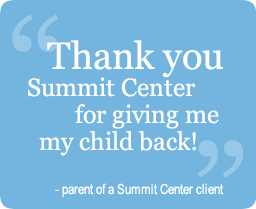By Dr. Gabriela Bronson-Castain
Happy New Year! As the hustle and bustle of the season ends, children and adults alike may be experiencing different emotions. Many families will feel even more stressed as schools reopen and the new semester begins in January. If you are looking for social/emotional support, we want to encourage you to think about what that may look like for the rest of the school year.
Summit Center offers lower-cost counseling services with our experienced doctoral trainees Sammy DeVincent, Savannah Miller, and Maddison Stokes. As the director of training at Summit Center, I have had the opportunity to get to know our three predoctoral trainees very well. They provide a wealth of knowledge, energy, and compassion. I know many people seek out licensed clinicians who may be able to sustain a long-term relationship, but here are some things to consider when exploring therapy with a trainee:
- Solution-focused brief therapy can be exceptionally helpful to children struggling with depression, anxiety, and/or social challenges. It allows kids to be in the driver’s seat and be an active problem-solver.
- Trainees are exceptionally good at building relationships with children and adolescents, and often kids feel a connection to them when they aren’t the same age as their parents or caregivers.
- The most common time for kids to stop therapy is the summer. Many take a break or stop altogether. Summer is a natural seam in a young person’s timeline.
- Saying goodbye is also a part of therapy. Many therapies end abruptly, which is not recommended. When working with a trainee, a young person has the opportunity to work through the feelings of loss and transition actively.
- Trainees often go the extra mile.
Of course, some people need long term therapy, and switching therapists can be detrimental to treatment. But not always. It’s a good thing to discuss at an intake. Sometimes it’s just the right amount of therapy.
In addition, Summit Center is dedicated to providing outstanding training for our pre- and post- doctoral trainees in the area of twice-exceptional development. Currently, this is not a core training in graduate programs; so we see our training of clinicians as a community service. We hope that over time every provider has compassionate understanding of our neurodivergent population, and how to provide strength-based treatments recognizing the unique needs. By the end of the training year, our trainees often times know more about neurodivergent development and therapies than the average community provider.
To schedule an appointment with any of our trainees, please indicate your interest by filling out this form.


